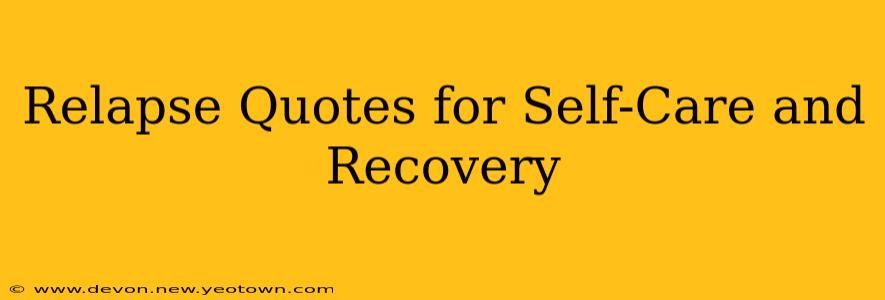Relapse is a painful but unfortunately common experience for many individuals striving for recovery. Whether battling addiction, mental health challenges, or other difficult life circumstances, setbacks are inevitable. Instead of viewing relapse as failure, it's crucial to understand it as a learning opportunity within the larger context of self-care and recovery. This perspective shift is key to maintaining hope and continuing the journey towards a healthier, more fulfilling life. This post explores powerful relapse quotes that offer comfort, strength, and guidance during these difficult times, focusing on self-compassion and the continuous process of healing.
Understanding Relapse: It's Not the End
Before diving into the quotes, it's vital to acknowledge that relapse doesn't erase the progress made. It's a temporary setback, not a complete failure. Many factors can contribute to relapse, including stress, triggers, lack of support, and underlying unresolved issues. Recognizing these factors is the first step towards preventing future relapses and strengthening your recovery journey.
What are some common triggers for relapse?
Triggers can vary greatly from person to person. Common triggers include:
- Stressful life events: Job loss, relationship problems, financial difficulties, and bereavement.
- Environmental cues: Places, people, or objects associated with past substance use or negative behaviors.
- Emotional triggers: Feelings of sadness, anger, anxiety, loneliness, or boredom.
- Physical triggers: Certain smells, tastes, or physical sensations that remind individuals of past experiences.
- Lack of support: Insufficient support systems or feeling isolated can make coping mechanisms much more difficult.
Inspirational Relapse Quotes for Self-Compassion
These quotes emphasize self-compassion and acceptance during relapse, reminding individuals that setbacks are a natural part of the healing process.
-
"Stumbling is not falling. It is an invitation to learn and grow." This quote beautifully illustrates that relapse offers opportunities for self-reflection and the development of more effective coping strategies.
-
"The path to recovery is not a straight line; it's a winding road with ups and downs." This acknowledges the inherent challenges of recovery and emphasizes the importance of perseverance. It's okay to have setbacks; what matters is getting back on the path.
-
"Relapse is not a sign of weakness, but an indication that you need more support." This quote removes the shame and stigma often associated with relapse and encourages seeking help when needed. Reaching out for support is a sign of strength, not weakness.
-
"Self-compassion is not self-indulgence; it is self-preservation." Practicing self-compassion during relapse is crucial for maintaining mental well-being and preventing further setbacks.
Quotes Emphasizing Learning from Mistakes
These quotes focus on the valuable lessons that can be learned from relapse experiences, promoting resilience and growth.
-
"The only true failure is not learning from your mistakes." Relapse offers the chance to identify triggers, refine coping strategies, and build a stronger foundation for future success.
-
"Every setback is a setup for a comeback." This empowering quote reinforces the possibility of recovery and encourages a positive outlook. Even after a setback, there's still potential to recover.
-
"What doesn't kill you makes you stronger." While this might seem cliché, it's often true. The experience of relapse, while painful, can strengthen resilience and self-awareness.
Moving Forward After a Relapse: A Plan for Self-Care
Recovery is a continuous process, and relapse is an opportunity for self-reflection and renewed commitment to self-care. Here are some steps to help you move forward after a relapse:
- Reach out for support: Talk to your therapist, support group, or trusted loved ones. Don't isolate yourself.
- Identify triggers: Reflect on the circumstances that led to the relapse to prevent future occurrences.
- Adjust your plan: Modify your recovery plan as needed, incorporating new strategies and coping mechanisms.
- Practice self-compassion: Be kind to yourself; relapse is a setback, not a failure.
- Focus on your strengths: Remind yourself of your accomplishments and progress in recovery.
Conclusion: Hope and Perseverance in Recovery
Relapse is a part of the recovery journey for many. By viewing setbacks as learning opportunities and prioritizing self-care and support, individuals can move forward with renewed strength and determination. Embrace the lessons learned, practice self-compassion, and remember that recovery is a process, not a destination. Your journey towards a healthier life is worth pursuing, and setbacks do not define your strength or worth.

